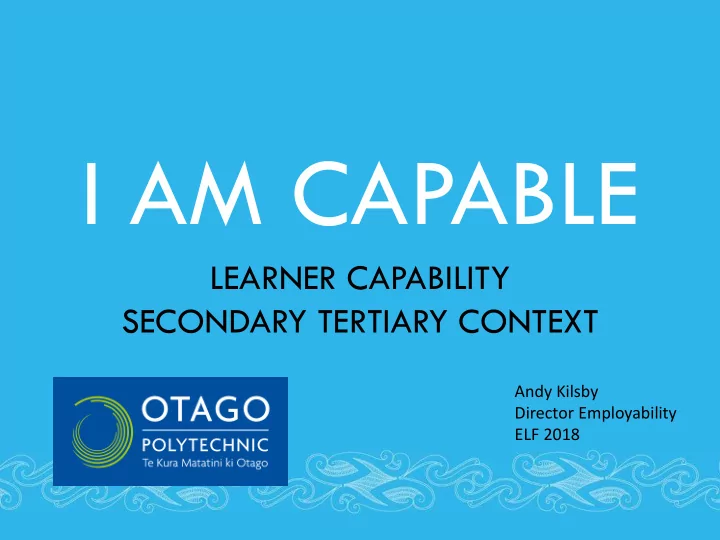

I AM CAPABLE LEARNER CAPABILITY SECONDARY TERTIARY CONTEXT Andy Kilsby Director Employability ELF 2018
“For us not just to survive but to thrive, … our young people need to be not only strong in literacy and numeracy and increasingly science, technology, engineering and maths (STEM) but, importantly, also to develop a ‘newer’ set of capabilities.” Rob McIntosh, Centre for Strategic Education, Seminar Series 266
What do we mean by CAPABILITIES ? Capable practitioners not only have specialised knowledge and skill but also a range of personal qualities and attributes that enable them to be effective in the work place and in the community. "A set of achievements—skills, understandings and personal attributes—that make individuals more likely to gain employment and be successful…" - Yorke and Knight, 2006
CAPABLE People • take effective action in whatever context they are operating • make a difference in their work places and in their communities • are future focused and are able to practise sustainably in both their personal lives and in their chosen vocation
I Am Capable is a web-based tool that students and tutors can access to enable learners to track the development of these capabilities and to produce verified evidence of these capabilities.
Curriculum Design and Redesign: “The rapid rate of technological change and the future world of work requires that as education providers we need to reconsider and adapt our curriculum to reflect the needs of a changing world. This world will place an emphasis on 21 st Century skills and competencies and require that those leaving our schools are innovative, able to work in multi-disciplinary teams and through global networks.” Nicholas Pole, Chief Review Officer , Education Review Office
Curriculum Design and Redesign: • Provide learners with opportunities to be more responsible and accountable for their own learning. • Provide learners with opportunities to learn with others and in teams . This means setting team goals and objectives, undertaking peer evaluation and being accountable as a team. • Provide opportunities for self-assessment , and ensure a safe environment in which learners can be themselves.
• Trades Academy delivery • Shared funding model school/ITP • 4/1 delivery (4 days at school, 1 at tertiary) • Unit Standard delivery • Outcomes – transition to further education, training/employment
Curriculum Design and Redesign: • What are learner experiences that engage, and provide an insight into pathway – ie further education and/or employment? • How can these experiences be designed to provide naturally occurring evidence of capability? • How do we incorporate this learner experience and the evidentiary outputs into required modes of learning assessment within programme requirements – ie Unit Standards/Graduate Profile Outcomes?
Curriculum Design and Redesign Our curriculum challenge is to embed such experiences within programmes, not for them to be an added extra or left to chance. • Avoid courses which are over-packed with content and over-taught. • Avoid learning being just a set of learning tasks – be concerned with the learning process at least as much as with content. • Have less formal teaching and more learner managed learning. • Provide authentic work experiences –through internships, clinical practice, work projects or commercial experiences on campus.
Learner Feedback How have you found the programme? • Proactive • Skilful • Knowledgable • Fun • Hands On • Experiential • Challenging
Learner Feedback What makes it different from what you have been doing at school? • Love it! • Not just a single subject • A whole day to focus and learn stuff • Not one subject after another – like at school. • Doing stuff – learning by doing • Doing stuff I’m interested in • Not like school – too much assessment, heavy workload
Teacher Experience • … a great group of students that are really engaged and wanting to learn. • …it is because we have tried to make it very practically based, but also got them to lead a lot of their own learning and work.
Challenges for Teachers Teachers need to: • create the opportunities for students to plan, organise and evaluate their own learning • shift the emphasis of their personal role from that of content expert to one of guide • to prompt dialogue and critical support and to stimulate reflection on learning processes and progress towards goals • Alignment to curriculum/assessment that does not naturally fit Developing teachers to thrive in a capability curriculum is no easy task, but is worth the effort .
2019 Priorities • Research into Validation of our Framework, and learner, staff, alumni research and curriculum improvements • Implementation across: • Year 1 of all OP degree level programmes • All new OP sub-degree level programmes • Pilot advisory process with selected secondary and primary schools
Contact us! andyk@op.ac.nz
Recommend
More recommend